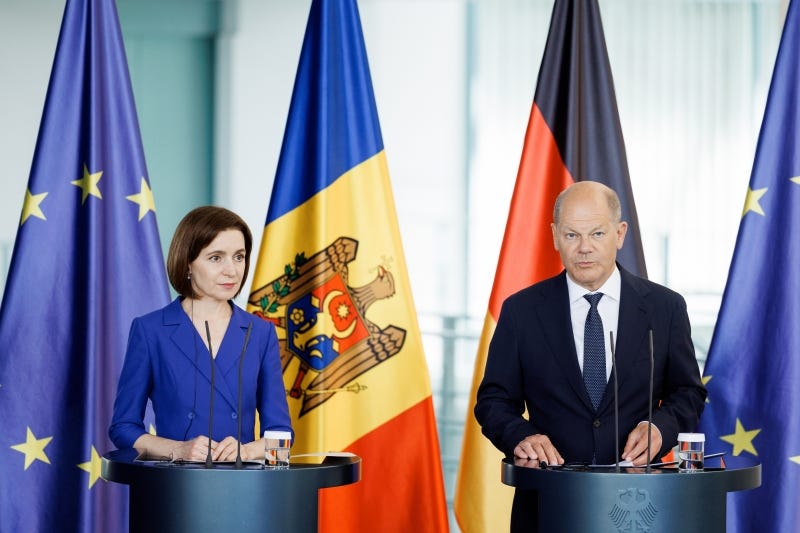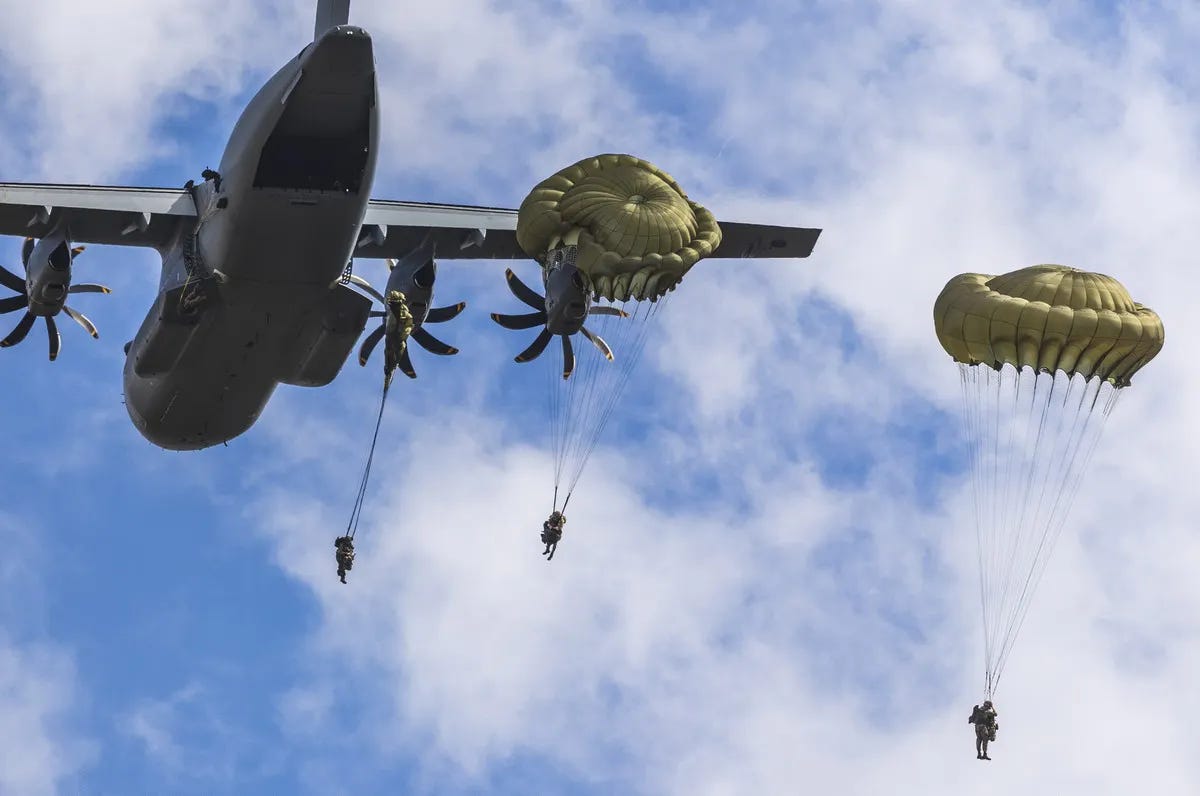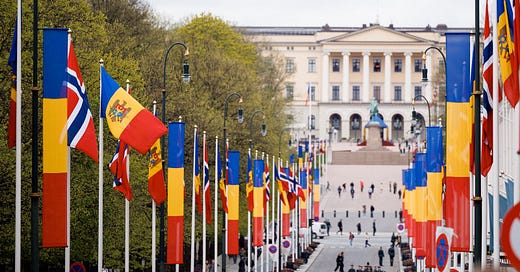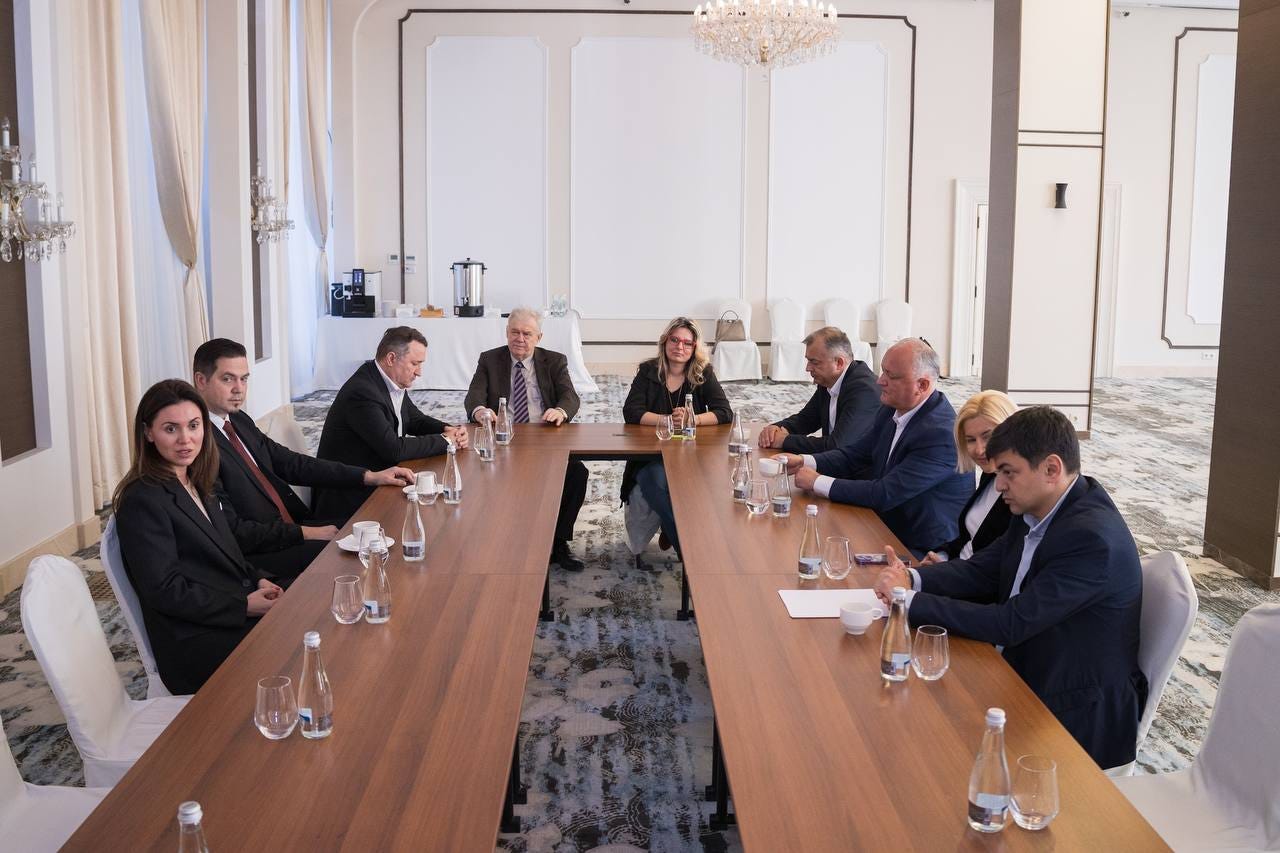Welcome back to Moldova Matters! This article has been a bit delayed because I’ve had a bit of work travel. It will catch us up on the major news since the last Weekly Roundup with the exception of an unfolding story entailing a new scandal in the justice reform effort. This story is too complex for the roundup so you’ll have a separate Quick Hit article in your inbox in the coming days.
Moldova International Affairs
This month Moldovan officials have continued with an aggressive schedule of international diplomatic visits aimed at gathering support for the country in light of the challenges of the War in Ukraine, as well as bolstering support for Moldova’s EU accession.
President Sandu traveled to Norway on May 6th on the first state visit by a Moldovan head of state in the country’s history. There she was welcomed by King Harald and the Norwegian Government for official receptions and talks. Welcoming the Moldovan President the King gave a speech, in part stating:
There are in fact quite a few similarities between our two countries. We are both relatively small. We have both been ruled by our neighbours. We are both relatively young independent nations, but have rich national histories.
And, perhaps most importantly, we share fundamental values – a belief in democracy, the rule of law and human rights.
During the visit the Norwegian government announced a 30 million euro grant to Moldova to bolster the country’s energy security and a Memorandum of Understanding MoU on energy cooperation. This adds on top of around 100 million euros that Norway has previously contributed to Moldova either directly or for refugee support since the beginning of the war. President Sandu also presented Moldovan wine companies and invited Norwegian companies to consider investing in Moldova’s energy sector.
The President then visited Germany on May 17th meeting with Chancellor Olaf Scholz. Following their meeting, they announced that Chancellor Scholz had accepted an invitation to visit Moldova this summer. This will be the first visit from a German head of government to Moldova for 12 years. In Germany President Sandu was also awarded the Robert Bloom prize For Democracy, a 25,000 euro cash prize which she committed to donate to a Moldovan NGO.

Also this week Prime Minister Recean and government delegation visited Brussels to discuss the beginning of EU Accession Negotiations. Rumors have circulated that the EU intends to open negotiations with Moldova and Ukraine in June before Hungary takes over the rotating EU Presidency in July. This rumor was dispelled by both sides following this visit with Moldovan officials saying only that they intend to be ready to open negotiations in June but that no hard date had been set.
Additionally, Prime Minister Recean signed a Security and Defense Partnership with the EU while in Brussels. Moldova is the first country to sign such a partnership with the EU with Josep Borrell, EU High Representative of the Union for Foreign Affairs and Security Policy saying:
“R. Moldova is the first country to sign the Security and Defense Partnership with the EU. This partnership will increase the country's resilience and provide new opportunities for cooperation,"
Aside from this information there have been no concrete statements or reporting on what this partnership actually means for Moldova or the EU.
Moldova’s aggressive diplomatic outreach comes against the backdrop of an increasingly challenging situation unfolding in Ukraine. Pressures at the frontline, especially around Kharkiv, signal a difficult summer fighting season for Ukraine. Meanwhile, a shortage of air defense across the board has seen Russia make increased gains in strikes against Ukrainian critical infrastructure. City wide blackouts in Odesa and other cities have occurred as Russia targets electrical generation infrastructure across the country. This has led Ukraine to begin importing electricity from Romania, Poland and Slovakia at times and to ask citizens to restrict electricity usage during peak hours. Right now spring weather is giving way to summer heat in Ukraine, implying that current shortages are likely to be magnified many fold next winter.
Security and Defense News
Here’s a rapid fire roundup of the top security and defense stories of the week:
Bomb threats continue. Four schools have been evacuated and searched in the last 2 weeks due to bomb threats being called in against the institutions. The security services found no threats and are searching for the source of the calls. Officials have said in the past that this wave of threats which has been ongoing in greater and lesser numbers since the start of the war is a Russian attempt to stretch Moldovan police thin and keep them distracted from other work.
Moldova conducts airborne exercises with the US Army. Elements of the Moldovan Army, FULGER Army Special Forces and US 82nd Airborne conducted parachute jumps in a training exercise last week. Around 200 military personnel from both countries took part in jumps from a 350m altitude.

FULGER Police Special Forces announce night exercises. Police have warned citizens that special forces units will conduct night exercises in towns and cities around the country. The SWAT style forces will simulate apprehending and detaining people on city streets. People are warned that these are just drills. Police released an explanatory statement saying:
“Day or night, in the capital or in the regions of the country, you will be able to see the cars of the special forces brigade and its employees, immobilizing citizens, blocking cars, detaining people, etc. You should know that this is a simulation, and nothing threatens your safety,”
Transnistrian activist Victor Plescanov was “pardoned” and released from custody. He had previously been convicted of flying a Ukrainian flag and condemning the Russian invasion. Mr. Plescanov was released by the separatist “authorities” after serving around half of his 3 year 2 month sentence. Following his release he thanked the OSCE, US Embassy, UK Embassy as well as the Moldovan Bureau of Reintegration and other foreign diplomatic posts for advocating for his release. The Bureau of Reintegration released a statement welcoming the release and calling on the Transnistrian “authorities” to release all of the political prisoners they are holding.
Moldovan and Transnistrian officials met in the 1+1 format for the first time in 4 months. OSCE officials who attended the meeting called it “constructive” and both sides put out a list of mostly technical questions that were discussed. Following the meeting Russian “peacekeepers” announced that between May 17th and June 17th they would conduct exercises in the security zone including the movement of APCs assigned to the bridge and crossing points. Moldovan officials condemned this as illegal and uncoordinated military movement that should have been discussed in advance at the Joint Control Commission (JCC).
Political News
One of the most intriguing political stories of the week has been moves by the pro-Russian opposition to unite around a single presidential candidate for the fall. “Journalist” Natalia Morari hosted a meeting of opposition parties aimed at consolidating around such a candidate to challenge Maia Sandu. Igor Dodon represented the Socialists at the meeting which was also attended by former Prime Minister Vlad Filat (PLDM), former Prime Minister Ion Chicu (PDCM), former Bashkan Irina Vlah and representatives of Chisinau Mayor Ceban’s MAN party. Following the meeting Dodon stated that they had mostly discussed strategy and noted that a decision for a common candidate will have to be made by the end of May. If no decision is made by that time Dodon stated that the parties will likely run their own candidates in the first round with an eye towards uniting on any anti-PAS candidate in the 2nd.
While many of these politicians have long been understood to be part of the pro-Russian opposition, the interesting new additions are former prime minister Filat and Natalia Morari herself. Both were once seen as leading figures in pro-European politics before suffering catastrophic falls from grace. Filat being convicted (at least for a time - cases are ongoing) of money laundering and involvement in grand corruption. Natalia Morari previously hosted a top show on TV-8 during the hight of the Plahotniuc state capture period. Her fall from grace came when it became known that she was in a relationship, and later had a child, with fugitive oligarch Veaceslav Platon. This undisclosed relationship involved major ethical breaches as she actually moderated TV debates that Platon participated in as he made a short lived attempt to run for office.
It remains to be seen if these opposition groups can come together in order to pick a common candidate to challenge Maia Sandu in October. For now it is notable that many former political enemies - at least publicly so - are coming together to discuss the prospect.
Other Political News
Here’s a rapid fire roundup of the top political stories of the week:
Stauceni is officially the newest city in Moldova. Parliament officially approved the Chisinau suburb’s breaking away from the capital following a local referendum and requests from the mayor’s office. The mayor of the town has stated that this will lead to more local control of funds and the ability to develop the growing bedroom community more quickly.
9 MPs affiliated with Ilan Shor attempted to register the “Pobeda” (Victory) group in parliament. Speaker of Parliament Igor Grosu rejected the attempt to register the group after conferring with parliament’s lawyers. The speaker noted that 5 of the 9 MPs were formerly of the Shor Party and that the Constitutional Court’s ruling outlawing that party specifically prohibited them from joining or creating other parliamentary factions. That leaves 4 MPs attempting to register the group and parliament’s standing rules say that an official faction must have at least 5 MPs.
Parliament has officially approved October 20th as the date of the referendum on EU membership. The final wording of the question has also been set as “Do you support the introduction of European integration into the Constitution of Moldova?” (yes / no). Previous draft language had been “Are you in favor of Moldova joining the EU?” Additional information will be included on the ballot specifying the exact constitutional changes (to the preamble and to allow Moldova to accede to EU law) that would be passed in the case of a “yes” vote.
Both the “Pobeda” (Victory) “block” and the Socialist Party have appealed to the Constitutional Court against the voting by mail law. Both parties called the law’s selection of countries where mail voting for the diaspora will be allowed “discriminatory” and noted President Sandu and PAS’s high support in those countries. The Victory “block” is also directly agitating to have mail voting opened in Russia.
Justice Reform
The main story in Justice Reform this week is a new fight and budding scandal between the Anti-Corruption Prosecutor’s Office and the Pre-Vetting Commission. This story is still unfolding and has many complex twists and turns so it is out of the scope of the Weekly Roundup. You’ll have a separate Quick Hit article covering it in your inbox in the next few days.
Here’s a rapid fire roundup of the other top stories in justice reform this week:
Moldova will again attempt to appoint a Prosecutor General. The application period for the latest competition to appoint the position ended on May 17th with 4 candidates. Interim Prosecutor General Ion Munteanu again applied for consideration as did Deputy Anti-Corruption Prosecutor Octavian Iachimovschi. Another prosecutor who applied is Alexandru Cernei who is most well known for controversially choosing not to prosecute Igor Dodon in the famous Kuliok case in which the former president was (allegedly) filmed taking a bag of money from oligarch Vlad Plahotniuc. Finally there is Grigore Vornicescu, a university lecturer about whom little is publicly known. A jury will again rate the candidates according to a new rubric (updated after the disaster of the last competition) and the top candidates will move on to the vetting process.
Another judge found guilty in the Laundromat case… then let go. Judge Georg Marchitan was found guilty of making an “unjust decision” in a case involving money laundering via a fake $200 million dollar debt between a UK company and a Russian company with a Moldovan acting as a guarantor. No penalties will be levied against the convicted corrupt judge since the statute of limitations has since expired due to the slow progression of the case.
Shor Party News
As far as is publicly known Ilan Shor remains in Moscow where he continues to coordinate his political forces in Moldova from afar. This week he announced on a youtube interview that he had received Russian citizenship, a fact confirmed by Moldovan police and Interpol representatives. Additionally, Shor’s second in command Marina Tauber was awarded the "Order of Friendship" in Moscow by Vyacheslav Volodin, Chairmen of the State Duma.
Meanwhile in Moldova Shor’s various political parties are facing challenges - here’s a quick roundup of the latest:
The Ministry of Justice has petitioned the court to ban the “Chance” party for 6 months. The Ministry cites evidence from the Central Election Commission (CEC) stating that Chance failed to comply with an audit of party documents and finances. Chance Party Leader Alexei Lungu denied the accusations saying that the party complied with all requests and called the legal action politically motivated and aimed at keeping the party out of upcoming elections. He also stated that normal procedure would be to request updated information from them rather than a direct move to ban the party.
A court has rejected a defamation lawsuit against President Sandu filed by Gagauzia Bashkan Evghenia Gutsul. The lawsuit followed a statement where the President explained her refusal to include the Bashkan in the government by saying that Gutsul was a representative of a “criminal group.” The court found both that the President’s words represented her freedom of speech and that the president hold’s immunity while in office exempting her from civil or criminal suits.
Economic and Infrastructure News
Here’s a rapid fire roundup of the top economic and infrastructure stories of the week:
The EU has agreed to extend Moldova’s tariff and quota free access to the block for another year. This agreement, which was announced after the beginning of the War in Ukraine, affects a variety of agricultural products such as apples, plums, grapes and grape juice, garlic, cherries and more. The Ministry of Economy welcomed this news and noted that since the introduction of this agreement Moldova’s exports in these areas have massively expanded - in the case of apples jumping from 1.2 thousand tons / year to 13.8 thousand tons. Now Moldova is a leading exporter of plums to the European Union.
Payment operator “Zolotaya Korona” (Russian for “Golden Crown”) has ceased operations in Moldova. No official explanation was given either by the company or the authorities, but Zolotaya Korona was the last mechanism allowing for digital money transfers between Moldova and Russia. Previously Shor officials had announced that the first transfers to the MIR payment cards that they were distributing were coming. Russian bank cards can only be used to pull out money in Transnistria.
The Ministry of Economy announced that the German Government, through the German Development bank, has given the country a grant of 10.7 million euros to develop local SMEs. This money will be absorbed by the “Organization for Small and Medium Enterprises Sector Development” (ODA) which will use it to support the ongoing loan guarantee program FACEM.
Parliament registered a bill putting the airport on a list of national properties that cannot be privatized. This bill is preparation for a new tender to find a concessions manager for the airport. Once on this national list, Moldovan law will allow the signing of a 5 year (rather than 3 year) lease on the property. MPs hope that this will add more security to the arrangement and open up the number of companies willing to bid for the concession.
A new road in Gagauzia was vandalized right after opening. The new bypass road outside of Comrat was paid for with EU funds and had the words “European Moldova. Let's build together" painted on the road in Gagauz. The night after this was unveiled and the road opened someone painted over the European message. Minister of Infrastructure Spinu oversaw the repainting of the road the next day and announced on social media that they are prepared to repaint it daily if necessary.
Moldova’s IT sector is the second largest per capita in Europe for the 2nd year. 4.5% of all registered employees in Moldova work in IT, putting the country only behind Estonia in the block. The IT sector now contributes around 6.7% of Moldova’s GDP.





